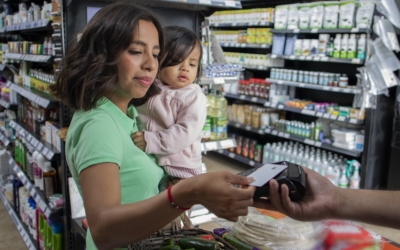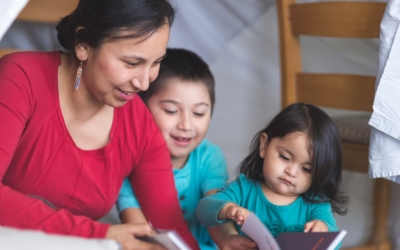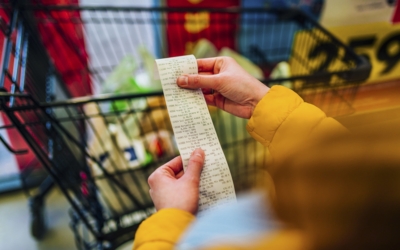During the first five years of the former I Can for Kids (iCAN) summer food program, the demand for our support skyrocketed by 550%. We continually received messages of gratitude from parents who struggled to buy their kids enough healthy food while keeping a roof over their heads. We logically assumed that a high level of appreciation from food-insecure families was a strong indication that our approach was effective.
However, when we transformed our service model from food packs to grocery gift cards, we suddenly realized that years of gratitude obscured the total lack of dignity and control that families experienced with food programs. When our research uncovered how our new service model empowered families with much more than increased access to healthy food, iCAN had to rethink how we measured success.
Basing impact on misguided outcomes
When we operated a summer food program, we evaluated our success by collecting data on common metrics within the charitable food sector. Most food providers demonstrate impact by calculating statistics such as:
- the rate of satisfaction among their recipients
- the total weight of food that they distributed over a specified time
- the number of meals or food hampers that they delivered within a defined period
- the amount of extra food they obtained through enhanced purchasing power
- the amount of food they rescue from landfills
However, when we gathered this type of data, our recipients and agency partners clearly signaled the following issues with the traditional food provision model:
- Food-insecure parents will always express gratitude rather than difficult feedback because they fear losing access to the foods that their children actually enjoy.
- The total weight, volume, or number of products that a program distributes has absolutely no bearing on whether households actually consume the food they receive.
- Securing substantial discounts on bulk orders doesn’t necessarily enable a charity to procure greater amounts of high-quality, culturally appropriate, and appealing products. More food doesn’t automatically translate to better food.
Establishing new metrics
Now that iCAN offers an income-based response to food insecurity, we can no longer rely on popular evaluation metrics to gauge our success. Instead, we began to collect data in support of the large body of evidence that demonstrates the need to improve financial resources to effectively eliminate food insecurity. In particular, we collaborate with our agency partners to explore how well our recipients can improve the following aspects of their lives:
- reducing anxiety about meeting their basic needs
- managing nutrition-related health conditions and food allergies
- participating in social meals at home, in school, and within the community
- maintaining a strong sense of self-esteem and confidence
We also ask our recipients to inform us of ways to avoid, remove, or minimize the many hidden costs that prevent them from accessing food provision programs. Based on their feedback, we adjusted our grocery gift card model to:
- minimize the time and emotional energy required to access our program
- optimize dignity by showing trust in their character, their struggles, and their strengths
- reduce stigma by never asking them to prove their need for support
- ensure they face no extra transportation costs to access support
Thanks to research with the University of Calgary, we’ve confirmed that our grocery gift card program does, in fact, empower our recipients with the dignity to improve the quality of their diets and the quality of their lives.
Looking ahead
The conclusions of a recent review article on the experiences and perceptions of food program users stress how food provision approaches cannot address the financial, cultural, social, and psychological needs of people who are food insecure. iCAN urges charities to weigh more complex markers of impact beyond metrics such as gratitude, satisfaction, pounds of food, or numbers of free meals. By doing so, the charitable sector can create and share data that supports more effective policy changes that will truly make a difference in the lives of the food-insecure populations we serve.
When you donate to our program, you contribute to a powerful force for positive change that empowers food-insecure kids with a deeper sense of self-esteem and social connection. To join iCAN’s expanding list of donors, sponsors, and champions, check out the different ways you can get involved or donate.
To discover more about I Can for Kids and their unique approach to childhood food insecurity, visit www.icanforkids.ca
About Donald Barker
Donald Barker has worked as a registered dietitian for more than 25 years. He also has a professional background in communications and has long advocated for populations who face adverse, unjust, or systemic barriers that lead to higher rates of poor social, mental, emotional, and physical health outcomes. Donald currently volunteers as an Advisor with iCAN to support our transition towards evidence-based approaches that help improve the well-being of children in Calgary who live in low-income and food-insecure households.
About I Can for Kids Foundation
I Can for Kids works closely with multiple agency partners to target and distribute grocery gift cards to food-insecure families who are most in need. The iCAN grocery gift card program is a more dignified and inclusive approach to dealing with food insecurity, allowing families to shop where everyone else shops and to choose foods that are appropriate for their health and cultural needs. Explore their website to discover more about iCAN’s impact over the years.
For more information and media inquiries, please contact iCAN Executive Director, Bobbi Turko at bobbi@icanforkids.ca.




